 |
yumapro
25.10-4
YumaPro SDK
|
 |
yumapro
25.10-4
YumaPro SDK
|
XPath 1.0 Expression Result Data Structure Support. More...

Functions | |
| void | xpath1_res_malloc_failed_error (xpath_pcb_t *pcb) |
| Generate a malloc failed error if OK. More... | |
| xpath_result_t * | xpath1_res_new_result (xpath_pcb_t *pcb, xpath_restype_t restype) |
| Get a new result from the cache or malloc if none available. More... | |
| void | xpath1_res_free_result (xpath_pcb_t *pcb, xpath_result_t *result) |
| Free a result struct: put in cache or free if cache maxed out. More... | |
| xpath_resnode_t * | xpath1_res_new_obj_resnode (xpath_pcb_t *pcb, boolean dblslash, obj_template_t *objptr) |
| Get a new result node from the cache or malloc if none available. More... | |
| xpath_resnode_t * | xpath1_res_new_val_resnode (xpath_pcb_t *pcb, boolean dblslash, val_value_t *valptr) |
| Get a new result node from the cache or malloc if none available. More... | |
| xpath_resnode_t * | xpath1_res_new_aioval_resnode (xpath_pcb_t *pcb, boolean dblslash, val_value_t *valptr) |
| Get a new AIO val result node from the cache or malloc if none available. More... | |
| xpath_resnode_t * | xpath1_res_new_valhdr_resnode (xpath_pcb_t *pcb, boolean dblslash, val_child_hdr_t *valhdr) |
| Get a new result node from the cache or malloc if none available. More... | |
| xpath_resnode_t * | xpath1_res_new_get2_resnode (xpath_pcb_t *pcb, boolean dblslash, val_value_t *nodeptr_val, xpath_get2_cb_t *nodeptr_cb, xpath_get2_form_t get2_form) |
| Get a new result node from the cache or malloc if none available. More... | |
| void | xpath1_res_free_resnode (xpath_pcb_t *pcb, xpath_resnode_t *resnode) |
| Free a result node struct: put in cache or free if cache maxed out. More... | |
| xpath_result_t * | xpath1_res_new_nodeset (xpath_pcb_t *pcb, obj_template_t *obj, val_value_t *val, boolean dblslash) |
| Create a new nodeset. More... | |
| xpath_result_t * | xpath1_res_new_cxt_nodeset (xpath_pcb_t *pcb, boolean dblslash) |
| Start a nodeset result with the current context node. More... | |
| xpath_result_t * | xpath1_res_new_origcxt_nodeset (xpath_pcb_t *pcb, boolean dblslash) |
| Start a nodeset result with the original context node. More... | |
| val_value_t * | xpath1_res_find_entry (xpath_result_t *result, int64 position) |
| Find the Nth entry in the node-set result for the position() function. More... | |
| int64 | xpath1_res_get_count (xpath_result_t *result) |
| Get the number of entries in the node-set result to support the count() function. More... | |
| int64 | xpath1_res_get_position (xpath_result_t *result, val_value_t *valptr) |
| Find the position of the specified entry. More... | |
| void | xpath1_res_add_resnode (xpath_resnode_t *resnode, xpath_result_t *result) |
| Add the specified resnode to the result. More... | |
| status_t | xpath1_res_flatten_result (xpath_pcb_t *pcb, xpath_result_t *result) |
| Convert any vahdr resnodes to valptr resnodes for simplified processing. More... | |
| xpath_resnode_t * | xpath1_res_find_resnode (xpath_pcb_t *pcb, dlq_hdr_t *resultQ, const void *ptr) |
| Check if the specified resnode ptr is already in the Q. More... | |
| xpath_resnode_t * | xpath1_res_find_get2_resnode (xpath_pcb_t *pcb, dlq_hdr_t *resultQ, xpath_get2_node_t *get2node) |
| Check if the specified resnode ptr is already in the Q (GET2) More... | |
| xpath_resnode_t * | xpath1_res_match_resnode (dlq_hdr_t *resultQ, xpath_resnode_t *findnode, boolean match_exact) |
| Match the specified result node. More... | |
| void | xpath1_res_copy_resnode (xpath_resnode_t *srcnode, xpath_resnode_t *dstnode) |
| Copy a resnode struct. More... | |
| const xmlChar * | xpath1_res_get_cxt_name (const xpath_pcb_t *pcb) |
| Get the local-name of the context node. More... | |
| const xmlChar * | xpath1_res_get_resnode_name (const xpath_resnode_t *resnode) |
| Get the local-name of the resnode node. More... | |
| boolean | xpath1_res_match_get2node (xpath_get2_cb_t *cb1, xpath_get2_cb_t *cb2) |
| Compare two GET2 CBs. More... | |
XPath 1.0 Expression Result Data Structure Support.
| void xpath1_res_add_resnode | ( | xpath_resnode_t * | resnode, |
| xpath_result_t * | result | ||
| ) |
Add the specified resnode to the result.
| resnode | resnode to add to result |
| result | result to receive the resnode |


| void xpath1_res_copy_resnode | ( | xpath_resnode_t * | srcnode, |
| xpath_resnode_t * | dstnode | ||
| ) |
Copy a resnode struct.
| srcnode | source resnode |
| dstnode | destination node |

| val_value_t * xpath1_res_find_entry | ( | xpath_result_t * | result, |
| int64 | position | ||
| ) |
Find the Nth entry in the node-set result for the position() function.
| result | node-set result to check |
| position | value of the position function |
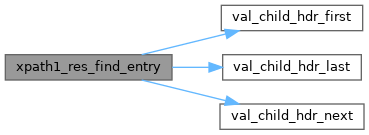
| xpath_resnode_t * xpath1_res_find_get2_resnode | ( | xpath_pcb_t * | pcb, |
| dlq_hdr_t * | resultQ, | ||
| xpath_get2_node_t * | get2node | ||
| ) |
Check if the specified resnode ptr is already in the Q (GET2)
| pcb | parser control block to use |
| resultQ | Q of xpath_resnode_t structs to check DOES NOT HAVE TO BE WITHIN A RESULT NODE Q |
| get2node | get2 node struct to find |

| xpath_resnode_t * xpath1_res_find_resnode | ( | xpath_pcb_t * | pcb, |
| dlq_hdr_t * | resultQ, | ||
| const void * | ptr | ||
| ) |
Check if the specified resnode ptr is already in the Q.
| pcb | parser control block to use |
| resultQ | Q of xpath_resnode_t structs to check DOES NOT HAVE TO BE WITHIN A RESULT NODE Q |
| ptr | pointer value to find |
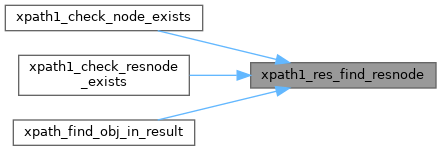
| status_t xpath1_res_flatten_result | ( | xpath_pcb_t * | pcb, |
| xpath_result_t * | result | ||
| ) |
Convert any vahdr resnodes to valptr resnodes for simplified processing.
| pcb | XPath parser control block |
| result | node-set result to flatten |

| void xpath1_res_free_resnode | ( | xpath_pcb_t * | pcb, |
| xpath_resnode_t * | resnode | ||
| ) |
Free a result node struct: put in cache or free if cache maxed out.
| pcb | parser control block to use (may be NULL) |
| resnode | result node struct to free |
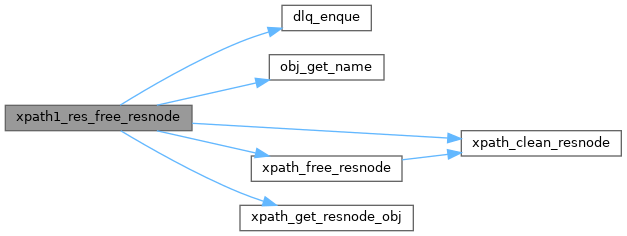

| void xpath1_res_free_result | ( | xpath_pcb_t * | pcb, |
| xpath_result_t * | result | ||
| ) |
Free a result struct: put in cache or free if cache maxed out.
| pcb | parser control block to use (may be NULL) |
| result | result struct to free |

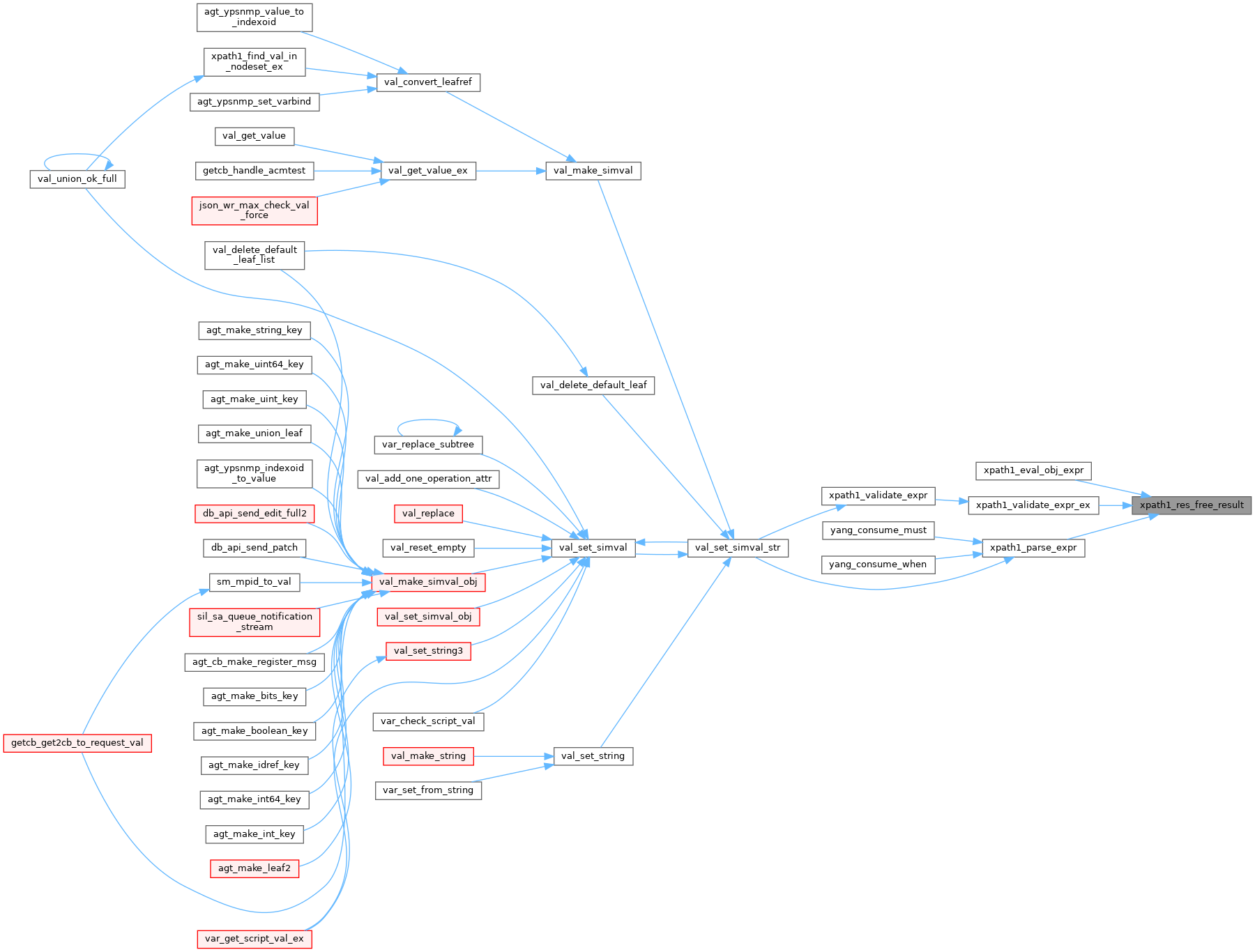
| int64 xpath1_res_get_count | ( | xpath_result_t * | result | ) |
Get the number of entries in the node-set result to support the count() function.
| result | node-set result to check |

| const xmlChar * xpath1_res_get_cxt_name | ( | const xpath_pcb_t * | pcb | ) |
Get the local-name of the context node.
| pcb | parser control block to use |

| int64 xpath1_res_get_position | ( | xpath_result_t * | result, |
| val_value_t * | valptr | ||
| ) |
Find the position of the specified entry.
This does not really work if GET2 nodes are being used The position() function is not required in NETCONF or YANG
| result | node-set result to check |
| valptr | entry to find |

| const xmlChar * xpath1_res_get_resnode_name | ( | const xpath_resnode_t * | resnode | ) |
Get the local-name of the resnode node.
| resnode | resnode to check |


| void xpath1_res_malloc_failed_error | ( | xpath_pcb_t * | pcb | ) |
Generate a malloc failed error if OK.
| pcb | parser control block to use |


| boolean xpath1_res_match_get2node | ( | xpath_get2_cb_t * | cb1, |
| xpath_get2_cb_t * | cb2 | ||
| ) |
Compare two GET2 CBs.
Match if same CB or same object for list, the return keys have to match
| cb1 | GET2 control block 1 to compare |
| cb2 | GET2 control block 2 to compare |
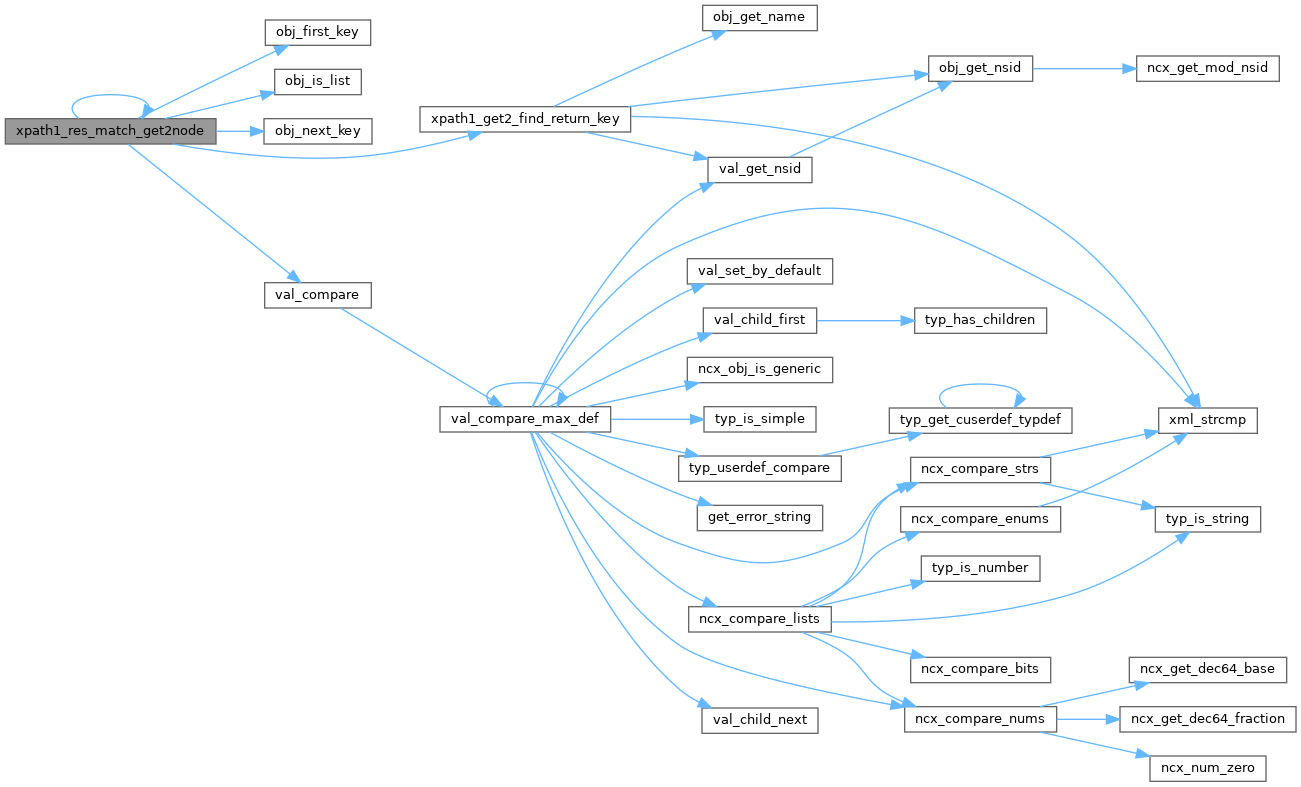

| xpath_resnode_t * xpath1_res_match_resnode | ( | dlq_hdr_t * | resultQ, |
| xpath_resnode_t * | findnode, | ||
| boolean | match_exact | ||
| ) |
Match the specified result node.
THIS IS THE CURRENT FUNCTION; USE INSTEAD OF: xpath1_res_find_resnode
Check if the specified resnode ptr is already in the Q
| resultQ | Q of xpath_resnode_t structs to check DOES NOT HAVE TO BE WITHIN A RESULT NODE Q |
| findnode | the resnode to find |
| match_exact | TRUE to match only the exact same CB == FALSE to match same object, same keystack |
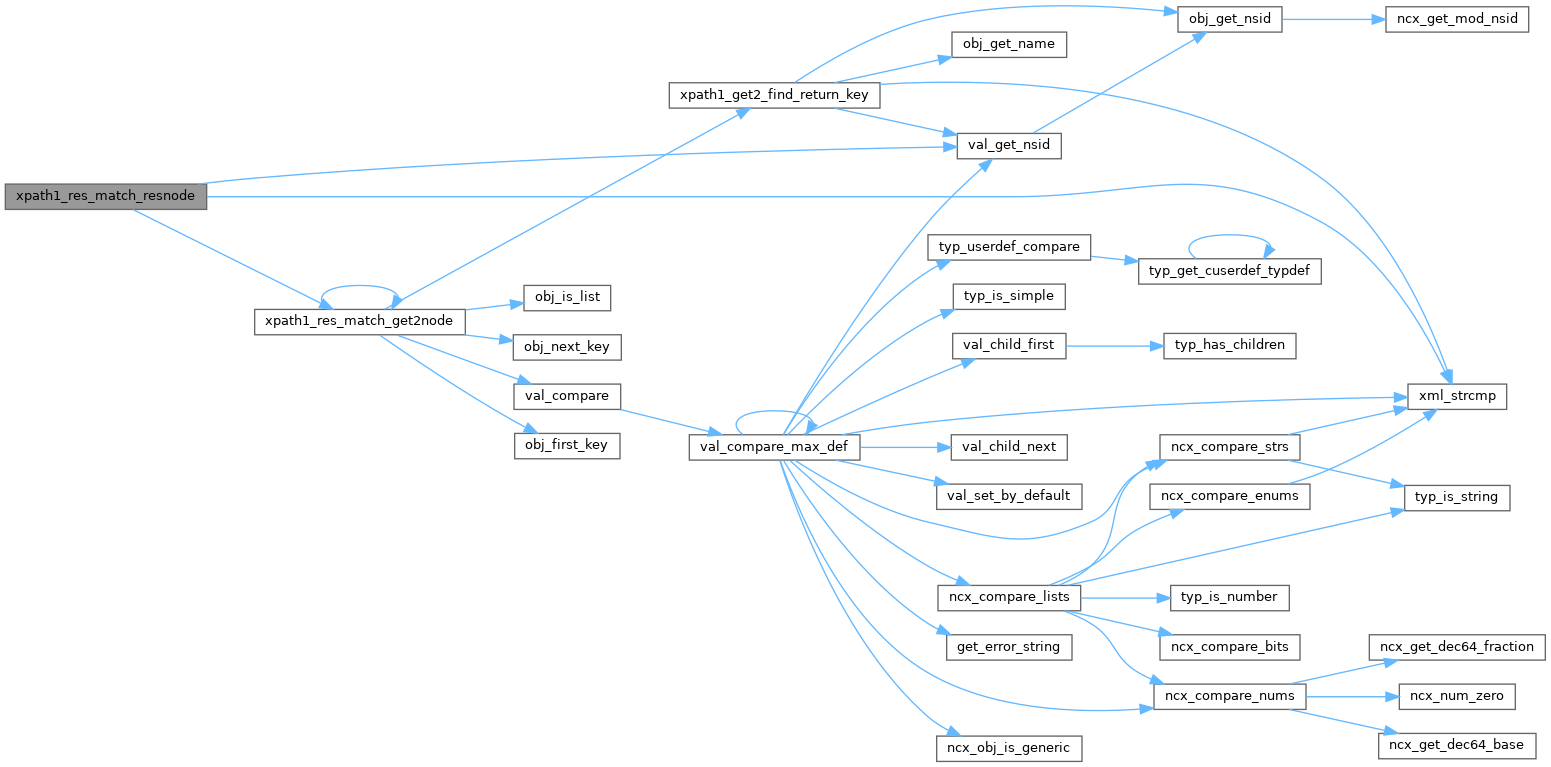

| xpath_resnode_t * xpath1_res_new_aioval_resnode | ( | xpath_pcb_t * | pcb, |
| boolean | dblslash, | ||
| val_value_t * | valptr | ||
| ) |
Get a new AIO val result node from the cache or malloc if none available.
| pcb | == parser control block to use if pcb->val set then node.valptr will be used else node.objptr will be used instead |
| dblslash | TRUE if // present on this result node and has not been converted to separate nodes for all descendants instead == FALSE if '//' is not in effect for the current step |
| valptr | variable pointer value to use |
| xpath_result_t * xpath1_res_new_cxt_nodeset | ( | xpath_pcb_t * | pcb, |
| boolean | dblslash | ||
| ) |
Start a nodeset result with the current context node.
| pcb | parser control block to use |
| dblslash | TRUE if unprocessed dblslash in effect FALSE if not |
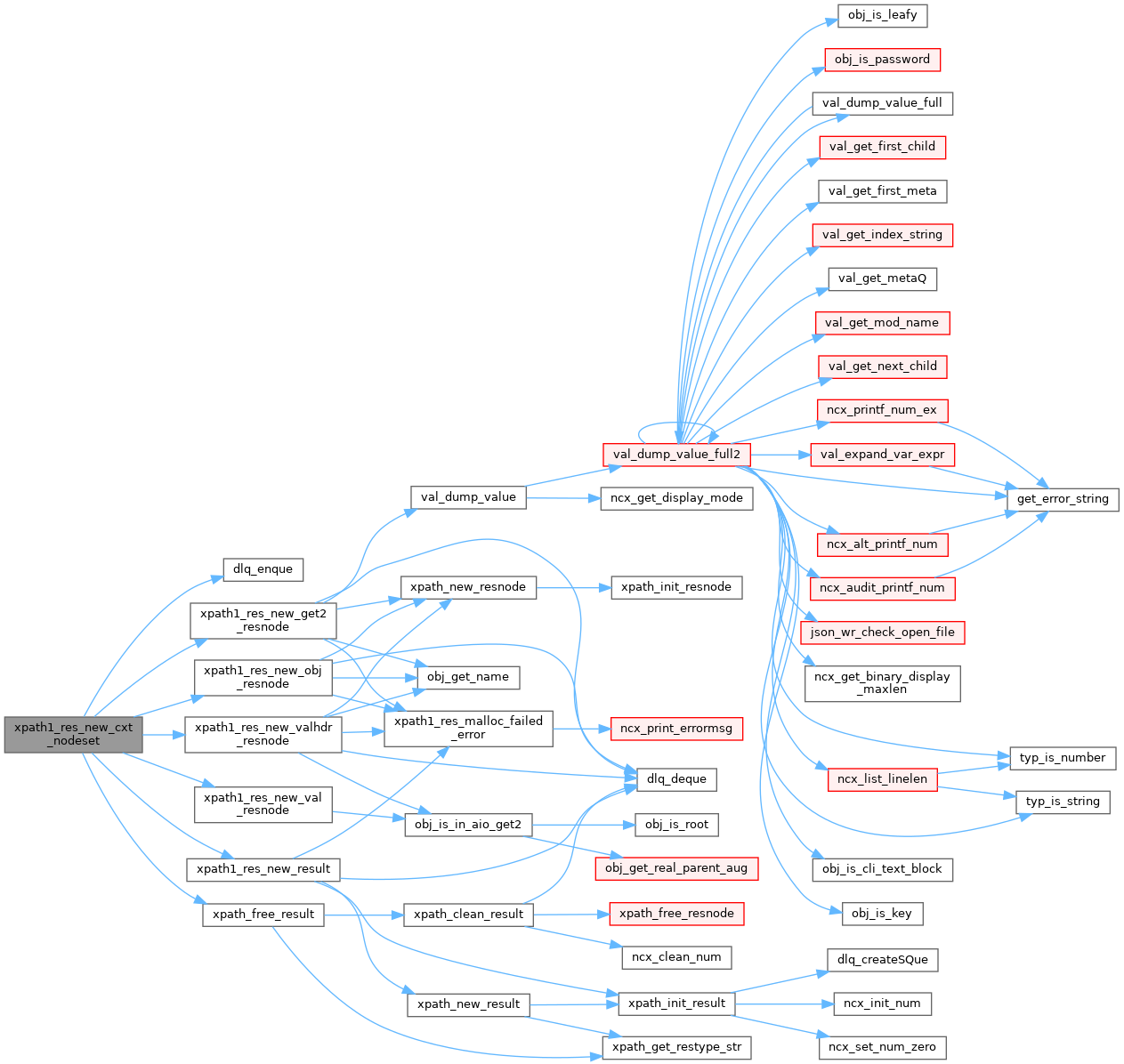
| xpath_resnode_t * xpath1_res_new_get2_resnode | ( | xpath_pcb_t * | pcb, |
| boolean | dblslash, | ||
| val_value_t * | nodeptr_val, | ||
| xpath_get2_cb_t * | nodeptr_cb, | ||
| xpath_get2_form_t | get2_form | ||
| ) |
Get a new result node from the cache or malloc if none available.
INPUTS:
| pcb | == parser control block to use if pcb->val set then node.valptr will be used else node.objptr will be used instead |
| dblslash | TRUE if // present on this result node and has not been converted to separate nodes for all descendants instead == FALSE if '//' is not in effect for the current step |
| nodeptr_val | xpath_get2_node_t val field pointer |
| nodeptr_cb | xpath_get2_node_t cb field pointer |
| get2_form | form enum for this entry |
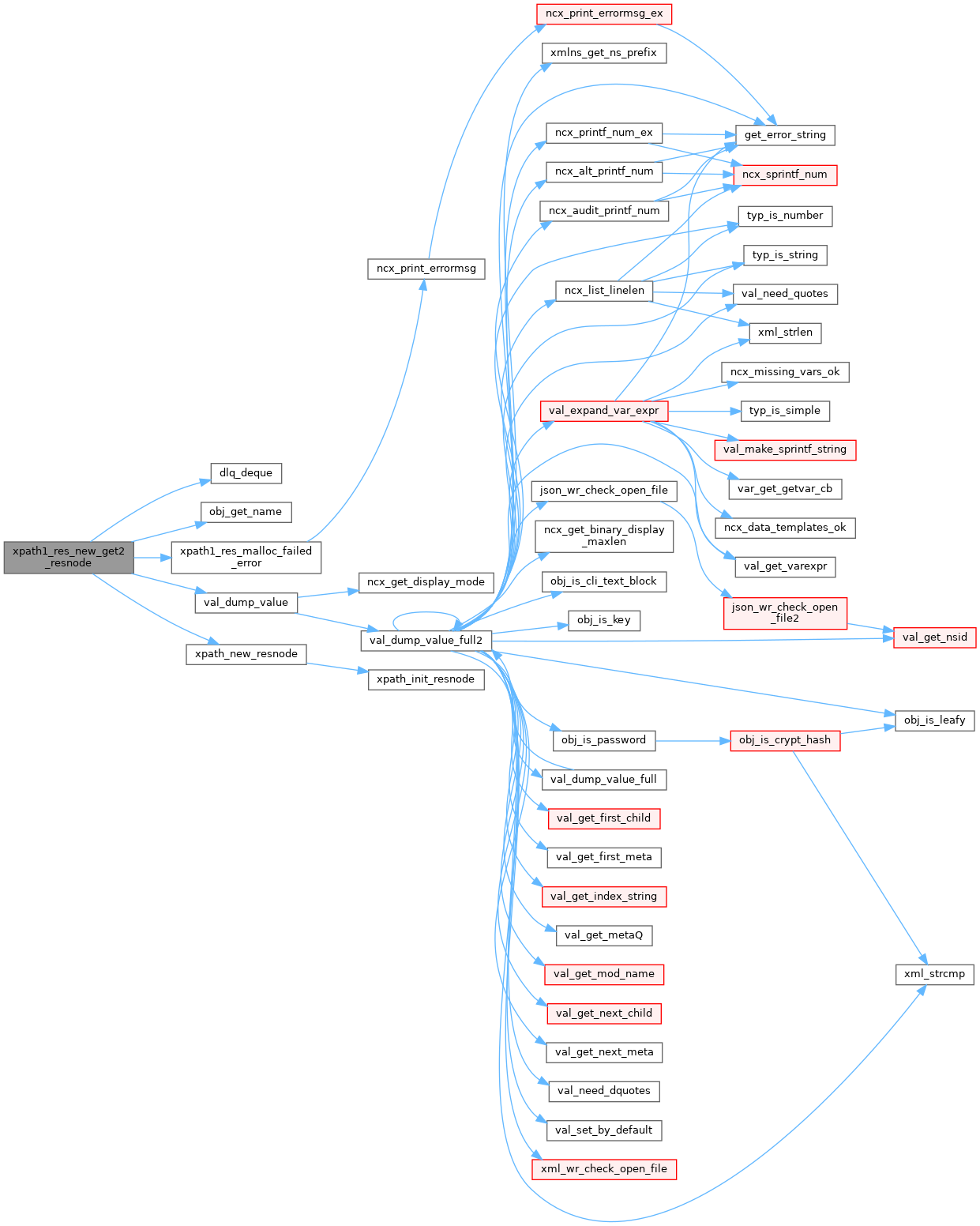
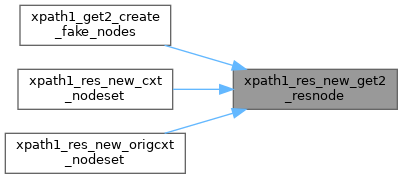
| xpath_result_t * xpath1_res_new_nodeset | ( | xpath_pcb_t * | pcb, |
| obj_template_t * | obj, | ||
| val_value_t * | val, | ||
| boolean | dblslash | ||
| ) |
Create a new nodeset.
Start a nodeset result with a specified object or value ptr Only one of obj or val will really be stored, depending on the current parsing mode
This is the old API before GET2 was added
| pcb | parser control block to use |
| obj | object ptr to store as the first resnode |
| val | value ptr to store as the first resnode |
| dblslash | TRUE if unprocessed dblslash in effect FALSE if not |
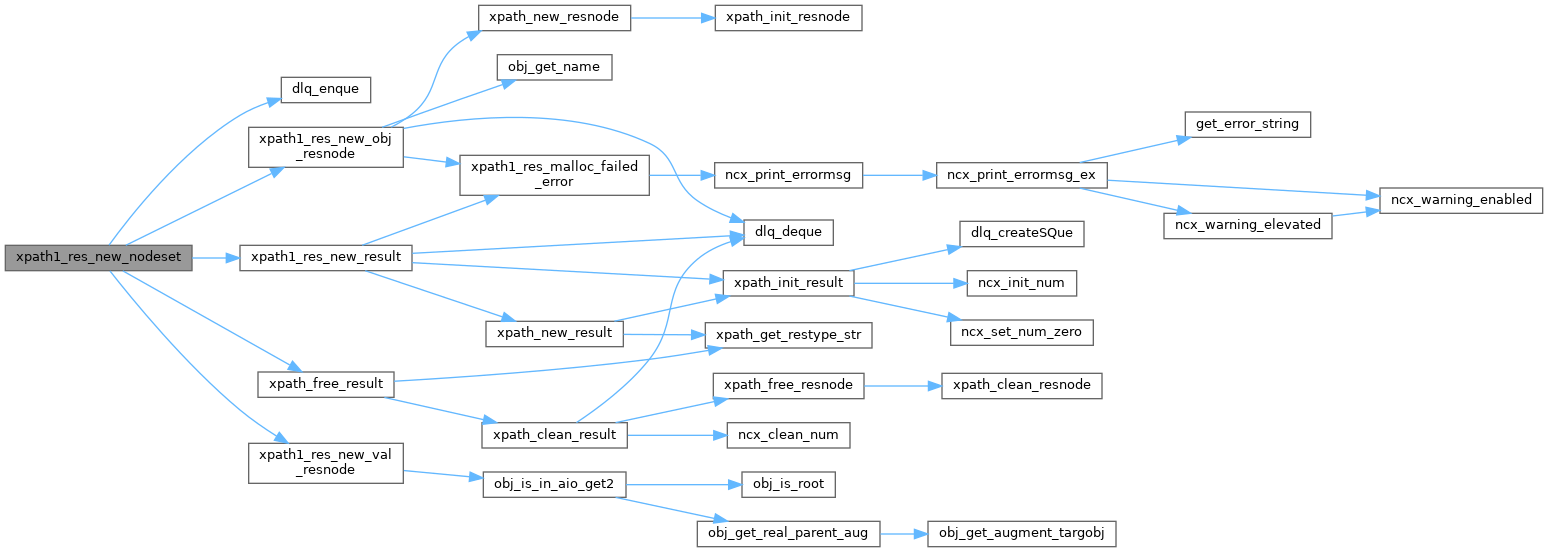
| xpath_resnode_t * xpath1_res_new_obj_resnode | ( | xpath_pcb_t * | pcb, |
| boolean | dblslash, | ||
| obj_template_t * | objptr | ||
| ) |
Get a new result node from the cache or malloc if none available.
| pcb | parser control block to use if pcb->val set then node.valptr will be used else node.objptr will be used instead |
| dblslash | TRUE if // present on this result node and has not been converted to separate nodes for all descendants instead == FALSE if '//' is not in effect for the current step |
| objptr | object pointer value to use |

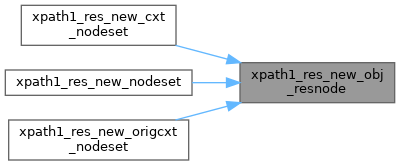
| xpath_result_t * xpath1_res_new_origcxt_nodeset | ( | xpath_pcb_t * | pcb, |
| boolean | dblslash | ||
| ) |
Start a nodeset result with the original context node.
| pcb | parser control block to use |
| dblslash | TRUE if unprocessed dblslash in effect FALSE if not |
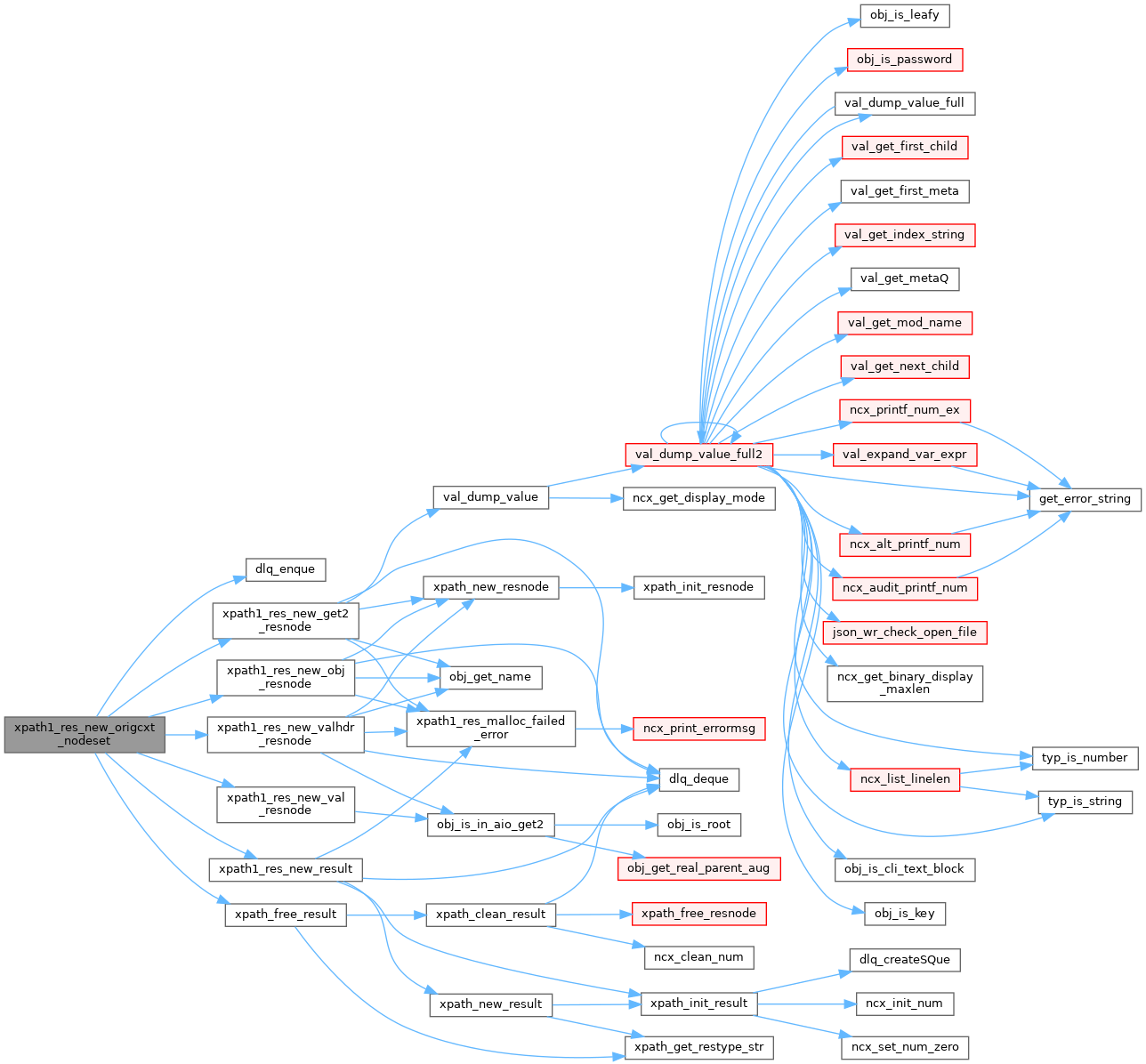
| xpath_result_t * xpath1_res_new_result | ( | xpath_pcb_t * | pcb, |
| xpath_restype_t | restype | ||
| ) |
Get a new result from the cache or malloc if none available.
| pcb | parser control block to use |
| restype | desired result type |


| xpath_resnode_t * xpath1_res_new_val_resnode | ( | xpath_pcb_t * | pcb, |
| boolean | dblslash, | ||
| val_value_t * | valptr | ||
| ) |
Get a new result node from the cache or malloc if none available.
| pcb | == parser control block to use if pcb->val set then node.valptr will be used else node.objptr will be used instead |
| dblslash | TRUE if // present on this result node and has not been converted to separate nodes for all descendants instead == FALSE if '//' is not in effect for the current step |
| valptr | variable pointer value to use |

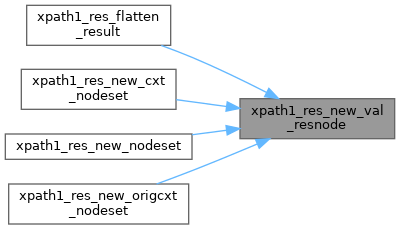
| xpath_resnode_t * xpath1_res_new_valhdr_resnode | ( | xpath_pcb_t * | pcb, |
| boolean | dblslash, | ||
| val_child_hdr_t * | valhdr | ||
| ) |
Get a new result node from the cache or malloc if none available.
| pcb | == parser control block to use if pcb->val set then node.valptr will be used else node.objptr will be used instead |
| dblslash | TRUE if // present on this result node and has not been converted to separate nodes for all descendants instead == FALSE if '//' is not in effect for the current step |
| valhdr | variable header pointer to use |

